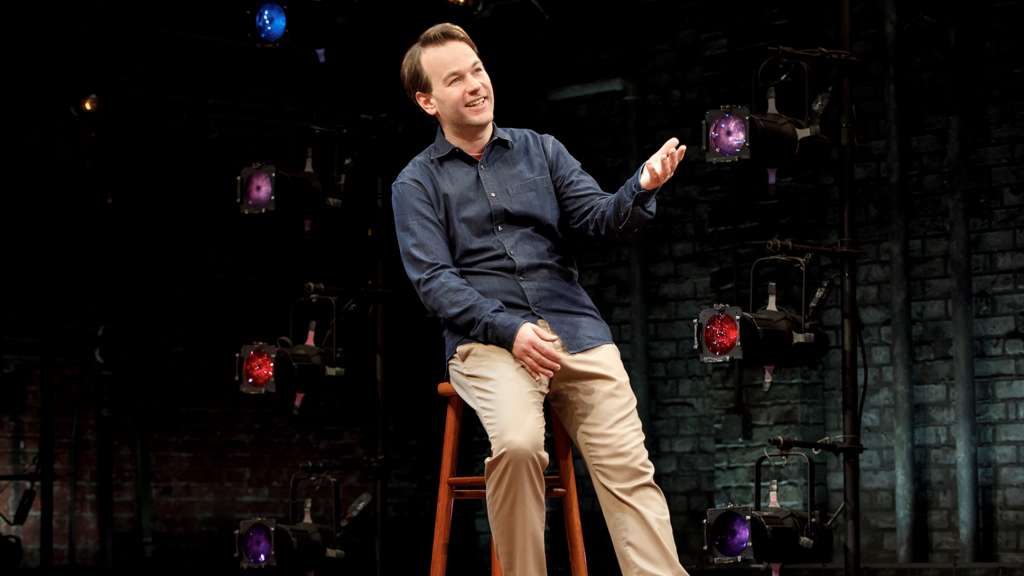Mike Birbiglia is an American stand-up comic, writer, and producer with a raft of comedy albums and TV specials under his belt. “Sleepwalk With Me” (2012), his award-winning directorial film debut, started with a one-man off-Broadway show that he wrote, directed, and starred in.
In 2011, he launched and then toured worldwide with his second one-man show, “My Girlfriend’s Boyfriend.” Other credits include the 2016 comedy-drama film “Don’t Think Twice,” a recurring role in the Netflix web TV series “Orange Is the New Black,” and regular contributions to NPR’s “This American Life.”
Birbiglia grew up Catholic in Shrewsbury, Massachusetts, the youngest of four. He is married to poet Jennifer Hope Stein. The couple have a young daughter named Oona.
His “everyman” humor tends toward body image issues, fear of growing up, and the perennial divide between men and women.
“I’m the kind of guy who could really put the brakes on an orgy.” “I’m not gonna have kids till I decide that there’s nothing else good that could really happen in my life.” “I’ve always been afraid of babies, ’cause they’re so small and smooshy…what happens if I’m holding the baby, and the baby just dies?…”
His current production, “The New One,” expands on the anxieties-of-fatherhood theme. The show launched in April 2017, with a 25-city tour, debuted off-Broadway, and ran for three months at Broadway’s Cort Theater.
Through Nov. 24, Birbiglia is mounting “The New One” at downtown LA’s Ahmanson Theater. The 90-minute production is directed by Seth Barrish and was named by “Entertainment Weekly” as one of the Top 10 Shows of 2018.
He starts off by establishing his love for his living room couch. This self-effacing piece of furniture invites him to snuggle, makes no demands, and allows him to scarf down pizza and ice cream guilt-free while watching true crime documentaries.
Then he enumerates seven reasons why he’s unfit for fatherhood: One of him is enough. He has a cat.
He gently ridicules the Catholicism in which he was raised. There are a few too many condom jokes and an uncomfortably graphic description of a visit he once made to an Amsterdam prostitute.
But for the most part, this is good, clean fun, R-rated middle-America style: a live-in relationship, a marriage at City Hall, a brother Joe who “used to be cool, but then he had two kids, and now he’s a loser.”
He’s low-key, likeable, and relatable. He makes his impeccable timing look easy. He’s pretty funny on his pre-parent distaste for children: “We got rid of smoking on planes — why not babies?” He’s baffled by the invasion-of-the-body-snatchers-like fugue state that comes over new parents: “Having kids is like a disease, but worse — ’cause they want you to have it, too.”
He touches on some home truths: that it’s usually the woman who wants and pushes for a kid; the husband follows along. The seeming superfluity of the father once an infant materializes. The potential for feeling shunted aside, for resentment, for self-pity.
There’s a nice bit where he’s alone in the apartment with Oona, the church bells down the street start playing “Ave Maria,” and — miracle! — the kid stops crying.
But make no mistake: being a father is not easy. One horrid day he finds that Oona has usurped the place on the couch usually reserved for his cat. Walking the baby in her stroller through the park with his wife, Jen, he tries to start a conversation and is shushed: “Oona doesn’t like when we talk.”
He feels like he’s watching his wife engaged in the greatest love affair of her life — through a window. Finally he’s pushed to what could roughly be called the show’s denouement: a whispered “I get why dads leave.”
There’s an uncomfortable silence — too close to the bone. After a beat, he quickly reaches for a laugh and recovers — “But he can’t leave! Where would he go? Who would have him?”
Birbiglia has been compared to the late Spaulding Gray, except less dark.
His delivery, style, and insights, such as they are, are designed to lull. Nothing wrong with that. But I’m pretty sure the question, “What happens if I’m holding the baby, and the baby just dies?” is the question that haunts every mother and father, from the moment the kid comes into the world till one of them breathes his or her last.
The implication here is that having a kid is in the end just more comedic material, a lark with some bumps along the way but with an inevitably happy ending. In his slacker Mr. Rogers outfit of khaki pants, button-down shirt and sneakers, Birbiglia gives the impression that he and his wife are akin to a modern-day Ralph and Alice Kramden, eking by in a cold-water Brooklyn flat.
Given his career, however, it’s a good bet they can afford nannies, housekeepers, and a grade of toys significantly higher than the load of cheap stuffed animals and made-in-China plastics that rain down on the stage once the baby is born. That probably makes parenthood easier on both of them.
And as if to bring his hipster credentials full circle, at the end of the show Birbiglia appeals to the audience to buy his wife’s latest book of poems.

